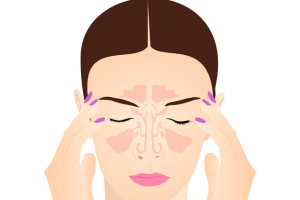No one really knows what it’s like to suffer from persistent nasal congestion due to recurring sinus infections, also known as chronic sinusitis. Besides struggling to breathe easily through partially swollen or blocked nostrils, the condition often takes a considerable toll on your daily life and overall well-being. To prevent the unnecessary duress and stress chronic sinusitis can have on your lifestyle, take some time to read this comprehensive guide to learn about the symptoms and effective treatment considerations available to improve your respiratory health and breathing comfort.
Chronic Sinusitis: More Than a Common Infection
Chronic sinusitis, often referred to as chronic rhinosinusitis (CRS), is a persistent inflammation of the sinuses that lasts for 12 weeks or longer, despite medical intervention. Unlike acute sinusitis, which is often a result of a bacterial or viral infection and resolves within a few weeks, chronic sinusitis is characterized by long-term inflammation.
Chronic Sinusitis Symptoms
Regular self-monitoring for chronic sinusitis symptoms is vital for early detection and effective management. The following signs tend to indicate the presence of a recurring sinus infection.
- Nasal Congestion: Persistent blockage of the nasal passages, making breathing difficult.
- Facial Pain and Pressure: Discomfort or pain in the face, particularly around the eyes and forehead.
- Discolored Nasal Discharge: Thick, discolored mucus draining from the nose or down the back of the throat.
- Reduced Sense of Smell and Taste: The inflammation can affect the olfactory senses, impacting the ability to smell and taste.
- Coughing: A chronic cough, often worse at night.
- Fatigue: The ongoing sinus inflammation can lead to fatigue and overall lethargy.
- Headache: Persistent headaches, especially around the forehead and eyes.
- Ear Pain or Fullness: Pressure in the ears or discomfort due to sinus congestion affecting the Eustachian tubes.
Also, recognizing lesser-known signs of a sinus infection is crucial for timely intervention. Look out for subtle indicators like tooth pain, ear pressure, and altered taste or smell. Fatigue, neck pain, and a persistent cough can also signal sinus involvement. By being aware of these less conventional symptoms, you can seek medical attention promptly, facilitating early treatment and preventing the progression of a sinus infection.
An early diagnosis allows for prompt treatment, reducing the impact on daily life and preventing complications. Monitoring oneself empowers individuals to take proactive steps toward improved sinus health, leading to enhanced overall well-being and a better quality of life.
If you find yourself experiencing several of these symptoms consistently for 12 weeks or more, it’s crucial to consult with a healthcare professional for an accurate diagnosis. Chronic sinusitis can significantly impact your quality of life, affecting sleep, work, and overall comfort.
Don’t Wait, Seek Out Effective Chronic Sinusitis Treatment Immediately
Urgency is advised when it comes to frequent or prolonged sinus infections, as the symptoms tend to become more severe and troublesome to manage, and in some cases debilitating without timely and proper treatment. Many individuals undergo a combination of medical therapeutics, lifestyle modifications, and surgical procedures for quick and long-term relief.
Initial Chronic Sinusitis Treatments
Most patients start with the following medical interventions to make their symptoms more manageable and treat the underlying infection.
Nasal Corticosteroids – These prescription or over-the-counter sprays help reduce inflammation in the nasal passages.
Antibiotics – In cases where bacterial infection contributes to chronic sinusitis, a course of antibiotics may be prescribed.
Decongestants – Oral or nasal decongestants can provide temporary relief from nasal congestion.
Saline Nasal Irrigation – Rinse the nostrils with a saline solution or nasal moisturizer to help clear mucus and alleviate inflammation.
Lifestyle Modifications
Depending on what’s triggering chronic sinusitis symptoms, some individuals can benefit from making the following changes to their daily regimen.
- Drink more clear fluids while avoiding caffeinated and alcoholic beverages to help thin mucus inside their nasal airways and promote normal sinus drainage.
- Inhale steam to add moisture to the dry and irritated or inflamed nasal passages to reduce swelling, dryness, and congestion.
- Take nasal corticosteroids, antibiotics, and other prescribed medications as directed.
- Use air purifiers to remove airborne irritants to improve breathing comfort and respiratory health.
- Learn about environmental triggers to avoid to decrease personal exposure to allergens and other irritants that may exacerbate symptoms.
Chronic sinusitis can develop from a variety of factors and impacts everyone differently. Take time to discuss your symptoms and situation with your sinus specialist for additional recommendations to reduce symptoms and prevent infection.
Medical Chronic Sinusitis Treatments

The following types of sinus surgeries target the direct cause of infection and symptoms and are more sophisticated and lasting solutions that provide optimal relief for those struggling with chronic sinusitis.
Image Guided Endoscopic Sinus Surgery (MIGSS™) – This procedure is ideal for patients experiencing nasal congestion, a diminished ability to smell, or sinus infections due to polyps, tumors, and infected or damaged nasal tissues that fail to respond favorably to traditional chronic sinusitis treatments.
Balloon Sinuplasty – This is a minimally invasive outpatient sinus surgery that utilizes a small balloon catheter to permanently widen blocked sinus passages to facilitate proper mucus drainage and quickly alleviate congestion. Patients go home the same day, with virtually no recovery time.
In-Office Polypectomy – Polyps and polypoid sinus disease are two common causes of chronic sinusitis that are most responsive to surgery with an endoscope and a microdebrider. This minimally invasive sinus treatment removes obstructions in the nose so patients can breathe, smell, and taste normally, without recurrent sinus symptoms and infections.
Septoplasty (Deviated Septum Repair) – Septoplasty is ideal for chronic sinusitis patients with an uneven nasal septum severe enough to prevent proper/normal airflow through the nose. The procedure corrects functional deviations in the septum to improve breathing comfort. Septorhinoplasty is a common variation of the deviated septum repair that addresses cosmetic concerns that affect the outward appearance of the nose/nasal septum.
Revision Sinus Surgery – This surgical procedure is often recommended for individuals with an advanced infection, severe scar tissue, adhesions, or recurring polyps in the sinus cavities that are untreatable with conservative medical interventions or a history of inadequate surgery. At the Southern California Sinus Institute, Revision Sinus Surgery is one of several chronic sinusitis treatments performed by Dr. Alen N. Cohen, MD, FACS, FARS. He’s a renowned Los Angeles-based sinus specialist with a minuscule revision sinus surgery rate.
Dealing with recurring sinus and respiratory infections, along with persistent nasal congestion, can be challenging. While conventional treatments are crucial, exploring lesser-known strategies may offer additional relief and contribute to long-term management.
Key Takeaways
It’s important for you to understand the symptoms of chronic sinusitis so you can seek timely medical attention and receive the most effective treatment to eradicate your symptoms and infection for optimal relief. Remember that everyone’s experience with chronic sinusitis is unique. Working closely with an ENT doctor allows you to take control of your sinus health, so you can breathe and experience life with greater comfort and vitality.
If your sinus symptoms persist despite medical interventions or if you believe you have chronic sinusitis, contact a board-certified ENT/Head and Neck Surgeon and renowned expert in the field of Nasal & Sinus Surgery at the Southern California Sinus Institute for an appointment.

